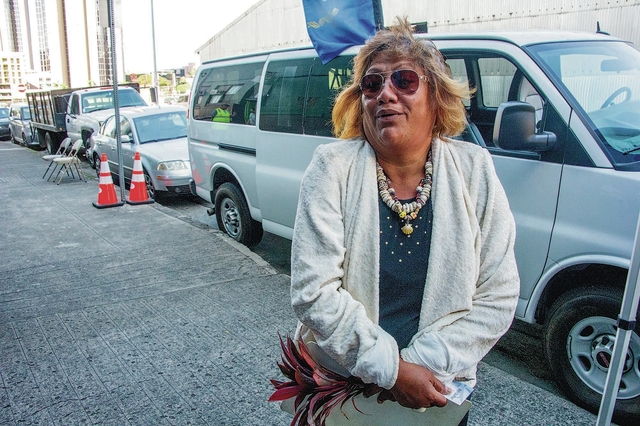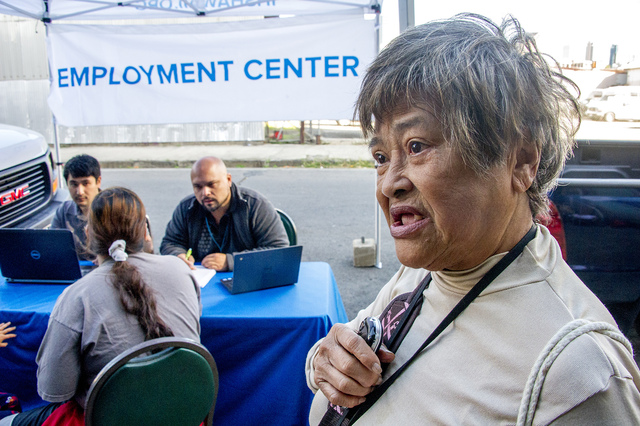Van brings job-seeking aid to homeless

CRAIG T. KOJIMA / CKOJIMA@STARADVERTISER.COM
The Institute for Human Services now has a job training van that heads out to encampments across Oahu to help homeless people find work. Shirley Chock applied for assistance Thursday at a kiosk set up in Kakaako.

CRAIG T. KOJIMA / CKOJIMA@STARADVERTISER.COM
Trainers working out of the new Institute for Human Services job van help the homeless with their resume writing and interviewing skills. Leticia Janice Garcia received help Thursday.


Shirley Chock’s been living in Waianae’s Nani Kai beach park ever since she fell off the sobriety wagon and lost her job two years ago, but she gained a sense of hope when she came across a new, mobile employment center set up Thursday outside a Kakaako food bank.
“I relapsed,” said Chock, 48, “but now I want to turn things around.”
November Morris, who runs the Institute for Human Services’ work employment and community services program, gathered Chock’s information and offered her a bus pass to come down to IHS in Iwilei, where she will be given a free cellphone, free bus pass, help writing a resume, training on how to interview for a job and clothes to wear for a real job interview, which IHS also will help arrange.
Down at IHS, case workers also help homeless clients obtain documents they frequently lose on the streets, such as new Social Security cards, birth certificates, state IDs or county driver’s licenses that they typically need to get a job or housing.
While the heavy lifting still occurs at IHS, the nonprofit’s new, 15-passenger van in October started fanning out across Oahu three times a week to make the initial contact with homeless people and, in many cases, get them excited about the possibility of working again.
“So many people need help,” Morris said. “Now we’re able to go out to where the need is.”
Don't miss out on what's happening!
Stay in touch with breaking news, as it happens, conveniently in your email inbox. It's FREE!
The van and its crew have appeared at 32 community centers, food banks, churches, homeless shelters, service agencies and homeless encampments from Waikiki to Haleiwa.
Since October, 137 homeless people — or those at risk of becoming homeless — have been helped.
Next month, IHS will drive the van out to the homeless encampment entrenched under the H-1 viaduct, where it will be joined by a volunteer doctor and housing specialists.
On Thursday, Leticia Janice Garcia, 72, also stumbled on the van that was parked outside Feeding Hawaii Together, along with its billowing blue flag banners and white pop-up tent.
Garcia held her last job as a cashier at an ABC store in 2005 and is now earning only $714 per month in Social Security benefits. She has an apartment in Chinatown but money’s tight.
“I really need help,” Garcia said. “I’ll do anything — cashier, greeter, customer service, dishwasher — anything except hard labor, because I’m too old. One foot in the grave already.”
After meeting with Morris, Garcia said she likely has found the help she’s been seeking.
“Plus, they’re very nice,” she said.
Through a grant-in-aid from the city, IHS spent $37,116 for its new van. The $5,000 spent on a tent, flag banners, a table, laptop computers and portable Wi-Fi were funded by the Clarence T.C. Ching Foundation and the Central Pacific Bank Foundation.
Once homeless clients are ready for an actual job interview, the goal is to get them hired in two to three weeks.
But IHS continues “job coaching” each client for up to three months to prepare them to be successful at work.
IHS also helps employers reduce their costs of hiring a homeless person by providing background checks and drug tests.
“Our ability to get people into jobs quickly depends on our relationships with business partners,” Connie Mitchell, IHS’ executive director, said in a statement. “We ensure the right client is always matched with the right employer.”
Anson Oliveros, 26, has been living in his 1993 Honda Civic for the past two months after he lost his $1,200-a-month apartment in Salt Lake when his commission-only cellphone sales job wasn’t enough to keep up with the rent.
Oliveros needs appropriate clothes to dress for a job interview, along with employer contacts that he hopes lead to a new position in sales.
After he introduced himself to the IHS team, Oliveros said, “Free job services. I think it’s great for people like me.”
14 responses to “Van brings job-seeking aid to homeless”
Leave a Reply
You must be logged in to post a comment.




EXCELLENT! However, I don’t believe that it is necessary to have published their real names and other “vitals”. Dignity–everyone needs their individual DIGNITY; especially those who are attempting re-enter a functioning lifestyle. Very sad and difficult for someone who is 72 years old, yet has the “Will” to keep going…
Very good idea, potentially helpful to some, but such a van might be put to better use actually transporting willing workers to day jobs cutting grass, pulling weeds, and cleaning buildings, all owned but poorly maintained by the state and county.
This is terrific. Way to go.
Its all good but the actual success numbers are probably very low.
Exactly. Let’s “check back” with these same people two years from now. Oh, wait – that would mean accountability and we don’t do that here.
Good to know that additional services are provided by this mobile unit to assist the homeless in finding employment….
GREAT. Give these people the assistance and “a sense of hope” as Ms. Chock said. All they need is a little help so they can turn their lives around. Hope there will be success stories from this. Good job, IHS.
Great idea and I have seen this type of assistance in action and it works. Maybe the city and/or state can hire some of these willing workers to clean our roadways.
On may way to work right now. On the way home I gotta stop and pay my cell phone bill. Drug addicts and poor decision makers and those mucking up the bus stops so my Grandma can’t sit while she waits for the bus, you’re most welcome.
You are a loser! Get help or try living on the street you Okole-puka!
A WiNNER! Finally something great about Hawaii again! God Bless you IHS!
Hope she finds a job and works til she is 100.
The high cost of housing is absolutely devastating for those on the lower income scales. Government needs to act fast to remove many of the homeless before the homeless start bringing down the high quality of life that has invigorated Waikiki and nearby communities.
This program sounds very promising. It’s a step in the right direction for sure. It’s not enabling the homeless to stay homeless but giving them opportunities and hope for the future.